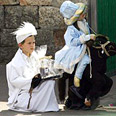
Purim. Archive Photo
Photo: AFP
How would you define Judaism? Many would say that Judaism is classified as a religion of traditions. Perhaps these people posit that as the seasons change we simply commemorate different holidays. They might also say that we infuse our daily life with custom and ritual to preserve the continuity of Judaism in the modern world.
Surely, Judaism has beautiful rituals and meaningful traditions, but is this really the true definition of Judaism? Rather than trying to find an answer to this by examining all of Judaism, let's just look at one aspect of it.
We are on the verge of celebrating the holiday of Purim. On Purim, we celebrate the Jewish people being saved by God from a decree of annihilation. This event took place about 1500 years ago in a city called Shushan, which happens to be in modern day Iran. Now, is this celebration just a tradition used to commemorate and remember an important past event? By looking at Purim through the mystical tradition we can find an answer.
The most important commandment of Purim is to read or hear the Megilla, which is a scroll depicting the story of Purim. It is stated in the code of Jewish law that if a person read the Megilla backwards, than they have not fulfilled the commandment.
According to the Jewish mysticism, this law has an important spiritual interpretation. The law is not only to mean that the Megilla shouldn't be literally read backwards, but also to mean that if one reads the Megilla as if it took place "backwards" in time, meaning the past, then they have not fulfilled the commandment. Rather, one must read the Megilla as if it the story is unfolding right now and not just as a past event.
The reason for this interpretation is because Judaism does not run in linear time; things do not just happen in the past as time marches on. In Judaism, time is cyclical and events progressively repeat themselves.
An annual carnival
Therefore, Purim and other holidays are not commemorations of historical events; they are more like an annual carnival. Just like a carnival comes through a town once a year, so too the energy or spirit of Purim comes through into our lives annually.
To look at Purim as a past event is like going to the vacant spot where a carnival once took place and commemorating the carnival that used to be there. But to perceive Purim as a reoccurring event is like actually going to the carnival.
Judaism is not a practice, but an experience. One of the main themes of Purim is about surviving seemingly impossible odds by turning to God in time of need. This dynamic has played it self repeatedly out through out Jewish history and in our daily lives. By keeping this teaching in mind, we can actually experience Purim rather than just remembering it.
To listen to the Dvar Torah please click here















